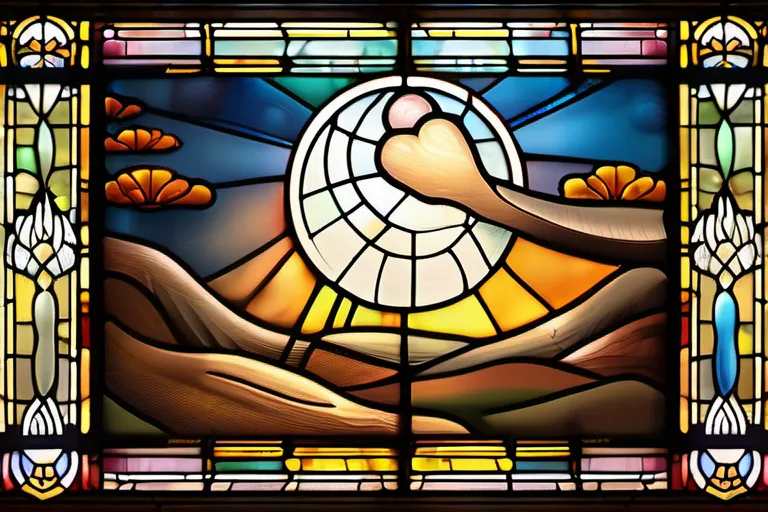Explore the historical, cultural, and religious roots of the Christian deity and its faith.
Delve into the fascinating origins of the concept of God in Christianity, tracing its roots from ancient religions to the emergence of monotheism. This comprehensive guide will provide a detailed exploration of the history, culture, and beliefs surrounding the Christian deity.
The Precursors: Ancient Religions and Deities
The origins of God and Christianity stretch back into the distant past, weaving through the layers of ancient civilizations like threads in a tapestry. Imagine stepping back in time to the cradles of human civilization: Babylon, Egypt, Greece—where did the idea of a single, supreme deity first take root?
In Babylon, the god Marduk was worshipped as the ruler of all other gods. He was seen as the creator and protector of mankind, much like how modern monotheistic religions view their own deities. Could it be that in the complex pantheon of Babylonian beliefs, a single deity began to stand out, foreshadowing the concept of monotheism?
Egypt’s gods were numerous and varied, each representing different aspects of life and nature. However, as time passed, the idea of a creator god like Amon-Ra, who unified many deities into one, began to gain prominence. Was this not a precursor to the notion that there is only one true God?
In Greece, while Zeus was the king of gods and men, the idea of a supreme, all-powerful god like Zeus Panhellenios (Zeus the All-God) suggested a move towards a single deity. Could this concept have played a role in shaping later monotheistic beliefs?
The ancient deities of these regions may seem distant and disconnected from today’s religious practices, but they laid the groundwork for something much bigger. These early precursors to monotheism might be seen as the seeds from which Christianity eventually grew.
As we explore further into history, we’ll see how these diverse beliefs gradually converged, merging and evolving until the concept of a single God became central in Judaism before spreading to Christianity. But for now, let us marvel at the rich tapestry of ancient religions that paved the way for the monotheism that would eventually shape much of Western thought and practice.
Monotheism Emerges: The Hebrew Bible and Judaism
The origins of God and Christianity are deeply rooted in the Hebrew Bible, where monotheism first emerged like a shooting star from the dark skies of polytheistic belief systems. Could it be that the ancient Israelites were the first to conceive of one singular, omnipotent deity? The Hebrew Bible, also known as the Tanakh, chronicles this journey with a narrative that intertwines historical events, divine interventions, and prophetic visions.
In the early days, the Israelites worshipped many gods, much like the ancient Egyptians revered their pantheon of deities. However, a powerful figure named Moses challenged this notion. He brought forth the idea of one God who was both unique and sovereign over all creation. This was no small feat; it required a complete paradigm shift in how people understood divinity.
The concept of monotheism wasn’t just a new religious belief; it was a fundamental reimagining of the world’s order. The Israelites were told to worship Yahweh, who was described not as a god among many, but as the sole creator and ruler of all that exists. This was akin to proposing that there is only one sun in an entire universe, where every other star pales in comparison.
The Ten Commandments, given to Moses by God on Mount Sinai, further solidified this new belief system. By prohibiting idol worship and commanding the exclusive worship of Yahweh, the Israelites were encouraged to see their relationship with God as a unique bond, unlike anything else in their world.
The influence of this monotheistic perspective on Judaism was profound. It not only shaped the religious practices and laws but also laid the groundwork for the emergence of Christianity centuries later. Just like the branches of a tree spread out to embrace the sky, the ideas of Yahweh spread far and wide, influencing societies and beliefs around them.
From these ancient origins, the path to what would become Christianity was paved with both divine revelations and human struggles. The roots of God and Christianity run deep into the Hebrew Bible, providing a rich tapestry from which the story of monotheism and its enduring influence continues to unfold. Could it be that the monotheistic concept introduced by the Hebrew Bible is still shaping our understanding of the divine today?
The Birth of Christianity: Jesus and the Early Church
Imagine stepping back into the ancient world, where whispers of a new religion began to stir like ripples on a calm lake. The life of Jesus Christ, often referred to as the Messiah, and the early Christian church are deeply intertwined with the fabric of history. How did this humble teacher from Nazareth manage to transform lives, and eventually, entire societies?
Jesus was a figure who challenged the status quo. He wandered through Galilee, delivering sermons that spoke of love, forgiveness, and the Kingdom of God. His teachings were radical for their time—proclaiming equality among people regardless of social standing or wealth. But how did these simple yet profound ideas resonate with those who heard them? Was it just the charisma of a charismatic leader, or was there something more at play?
The early Christian church emerged in a world divided by conflict and uncertainty. It quickly gained followers who were drawn to its message of hope and salvation. The church began as a small community but rapidly expanded, facing persecution along the way. How did they maintain their unity amidst trials and tribulations? What drove them to endure suffering for their beliefs?
The impact of Jesus and the early Christian church can be seen in the way we live today. Their teachings continue to shape ethics, morality, and even politics in many parts of the world. How has Christianity evolved from its origins into a global faith with diverse interpretations? The journey is one of transformation and resilience, reflecting the enduring legacy of those who first embraced the Way.
Through it all, questions linger: What makes certain beliefs so powerful that they can change history? And how do we reconcile the complexities of human nature with the ideals espoused by figures like Jesus?
The Spread of Christianity: The Roman Empire and Beyond
The Spread of Christianity: The Roman Empire and Beyond
Imagine, if you will, the vast expanse of the Roman Empire as a colossal stage where a new faith began to dance its way across continents. How did this small Jewish sect manage to transform into a global religion? Was it simply through the sheer force of belief, or were there other factors at play?
Consider the strategic location and infrastructure of the Roman Empire. It was a network of roads that connected far-flung provinces, making it easier for Christians to spread their message far and wide. The Pax Romana, a period of relative peace and stability, provided fertile ground for religious ideas to flourish.
- Consider how the emperor Nero’s persecution of early Christians might have inadvertently boosted their numbers, turning martyrs into heroes in the eyes of many.
The city of Rome itself became a crucible where Christianity faced its greatest challenges and triumphs. In the shadow of the Colosseum, where gladiators once fought to the death, Christian symbols began to be carved onto walls, a subtle yet powerful sign of defiance against the status quo.
- Reflect on how the Roman concept of civitas, or citizenship, might have been adapted by Christians to include not just Roman citizens but all believers in their community.
The apostles themselves played a crucial role in this expansion. Figures like Paul, with his eloquence and missionary zeal, became the torchbearers of Christian doctrine, traveling far beyond Jerusalem’s walls to spread their message. His letters still resonate today, offering guidance that transcends time and place.
- Imagine the impact of Paul’s missionary journeys, turning small communities in Asia Minor into centers of Christianity before his eventual execution in Rome.
The Roman Empire’s decline and the rise of new powers like the Eastern Roman (Byzantine) Empire and the various Germanic tribes provided a complex landscape for Christian influence. In some regions, Christianity became the official religion, while in others it coexisted with other belief systems, shaping the religious tapestry we see today.
- Consider how the conversion of Constantine to Christianity in 312 CE marked a turning point, not just for Rome but for all of Europe, ushering in an era where Christian symbols and values would come to dominate public life.
The spread of Christianity was neither linear nor smooth. It faced countless obstacles, from internal disputes over doctrine to external pressures from pagan and later Islamic empires. Yet, through it all, the faith continued to grow, adapting to new contexts while maintaining core tenets.
- Reflect on how the concept of sola scriptura, or scripture alone as a basis for Christian faith, emerged during this period, challenging traditional religious practices and emphasizing the importance of personal reading and interpretation of texts.
The journey of Christianity from a small sect in Judea to a global religion is a testament to resilience, adaptation, and the power of belief. It continues to inspire and challenge us today, as we navigate the complexities of our own faith journeys.
The Trinity: The Development of Christian Theology
Imagine a journey through time, where the concept of The Trinity was slowly woven into the tapestry of Christian theology. How did this central tenet come to shape the very fabric of belief in God and Christ? The development of the Holy Trinity is a fascinating exploration that intertwines with the rich history and cultural evolution of early Christianity.
In the earliest days of Christianity, followers believed in one God who was both Father and Son. It wasn’t until the Council of Nicaea in 325 AD that the concept began to take shape more clearly. How did this council manage to agree on a complex idea that had eluded theologians for centuries? The debate was intense, with bishops from all over the empire gathering to discuss the nature of God and Christ.
- Was Jesus fully divine or just a man?
- How could Father, Son, and Holy Spirit be one without merging them into a single entity?
The council eventually settled on the Nicene Creed, which defined the Trinity as ‘of one substance with the Father,’ ensuring that Christ was fully divine but still distinct from the Father. This decision wasn’t just a theological breakthrough; it was a monumental step in shaping Christian doctrine and practice for centuries to come.
The development of the Trinity also mirrored broader cultural shifts, blending Greek philosophy with Jewish monotheism. It’s a reminder that religion is not static but evolves through dialogue and debate. Just as the early Christians sought to understand and articulate their faith amidst conflicting ideas, modern Christians continue this tradition today, grappling with new questions about the nature of God in an ever-changing world.
From the councils of ancient times to the pulpits of today, the concept of the Trinity remains a central pillar of Christian belief. Its development is a testament to humanity’s enduring quest for spiritual truth and understanding. How do you see the Trinity influencing your own faith journey? Is it a comforting doctrine or a complex mystery?
The answer lies in each individual’s personal experience and interpretation. As we continue our exploration, remember that the history of Christianity is not just a story of dogma but a narrative of human faith and its enduring quest for meaning.
Christianity Today: Modern Interpretations and Controversies
Modern interpretations of Christianity are like a vast tapestry, woven from threads of tradition and contemporary thought. Have you ever wondered how a faith born in the dusty streets of Jerusalem has evolved into such diverse expressions today? The fabric of Christian doctrine is intricate; it includes everything from theological debates to the role of religion in society.
One of the most contentious issues within modern Christianity revolves around the interpretation of key doctrines. Take, for instance, the Trinity: once considered a mystery too great for human comprehension, its understanding has evolved over centuries. Today, theologians debate whether the concept should be seen as three persons or as one being with multiple facets.
The role of religion in modern society is another area fraught with controversy. Some argue that Christianity offers solace and guidance to those navigating a complex world. Others contend that it can be used as a tool for oppression, especially when religious doctrines are rigidly enforced. How do we reconcile these viewpoints? Is religion a force for good or a potential source of division?
Furthermore, the conversation around LGBTQ+ rights within Christian communities highlights how deeply intertwined theology is with social issues. Should Christians accept individuals who identify as LGBTQ+, or should they adhere strictly to traditional interpretations that might exclude such people from full participation in religious life? These questions have sparked intense debates and have sometimes led to schisms within churches.
It’s fascinating to consider how modern technology, like social media, is reshaping the way Christians engage with their faith. Platforms provide a space for dialogue but also echo chambers where differing views can be polarized. How should Christians navigate this digital landscape to promote unity and understanding?
The journey of Christianity in the 21st century is a reflection of broader societal changes. As we move forward, how will these contemporary interpretations shape the future of Christian belief? Will they lead to greater inclusivity and openness, or will they reinforce existing divisions? The answers lie in our collective efforts to engage with these complex questions.
Conclusion
 By the end of this article, you’ll have gained valuable insights into the origins of God in Christianity and a deeper understanding of its historical and cultural significance.
By the end of this article, you’ll have gained valuable insights into the origins of God in Christianity and a deeper understanding of its historical and cultural significance.











